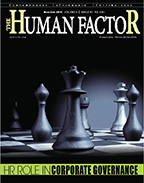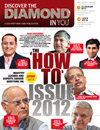NALIN THAKUR GROUP PRESIDENT-HR AND SYSTEMS, ANIL LTD. Culture is the determining factor Nalin Thakur (Group President-HR and Systems, Anil Ltd.) says an organisation has to clearly and comprehensively define and understand its culture because often the culture becomes an issue, not the talent of the candidate Issue Date - 01/03/2013 |
 Q. How has your recruitment style evolved over the years? Q. How has your recruitment style evolved over the years?A. We have evolved over the years in the usage and adaption of technological advancements, but at the core, it has always been to find the best fit for the position and the company. The paths have kept changing but the destination of the process has always remained the same – to look for the best fit. Q. How do you access candidates? Define the criteria on which you judge them? A.position, but what we mainly look for in a candidate is the attitude. We do not want the finished product, we want learners. Someone with the willingness and enthusiasm to continuously keep learning. We have realised that the people with such mindset are often the best performers because they enjoy what they do. The training provided by company also tends to have the best results with such group of people. As for methodology of selection, we use combinations of them. For trainees, we have group discussions, written tests (for few positions), followed by personal interviews. For middle and senior positions, we have rounds of personal interviews. For senior positions, we even get psychological profiling done. Though we follow various tools for selecting the right candidate, we have a flexible approach and try different methods all the time. Q. Share with us your best recruitment experience. What made it so special and unique? A. It is difficult to single out any particular case because barring few cases, most of the selections have turned out to be good experiences for us. However, it is always wonderful to recruit and subsequently work with the youngsters. They bring fresh and different perspective to the work environment. Q. What do industries and sectors need to adopt today to put a fair and unbiased recruitment process in place? A.processes are unbiased and fair, it is their interpretation and implementation that is faulty most of the time. Companies will have to invest heavily in training the selected candidates to bring the best out from them. The training must be on all fronts – technical as well as cultural. Many companies including ours do these things. Q. What do you think are the current drawbacks of this process? A. Like I said, the system that works for you is the best system. Be alert to the changing times and adapt accordingly. But there is no need to go for the wholesale changes. |
Q. How has the face of recruitment evolved over the years? A. Rapid technological advancements have certainly changed the way companies recruit today. We have so many websites catering to the needs of job applicants. We have social and professional networking sites to do the reference check and make initial assessment of a candidate. We have primary interview with candidates over Skype before calling them over for personal interviews. Q. What are some of your unique and cost-effective strategies for recruitment? A. One of the best recruitment strategies is to go for employees’ referral scheme. Our employees know our culture and they are the brand ambassadors for the company. Our experience in this regard has been quite satisfying. Q. How do you predict the future of recruitment process? A. Technological advancements are likely to gain more momentum and we have to continuously keep ourselves abreast with these rapid changes. Q. What are the major recruitment errors done by HR that further result in wrong hiring? How can this be avoided? A. Company has to clearly and comprehensively define and understand its culture because often the culture becomes an issue, not the talent of the candidate. A good candidate in an alien culture would be rendered ineffective. This is easier said than done but an organisation has to know itself well before it assesses a candidate for the fitment. Most of the great organisations have this understanding. Their value systems, policies, work practices, structure and all the things that go into determining the organisational culture are well articulated and more importantly, understood well by people working for them. |
Shishir Parasher
|
|
|



